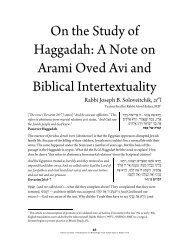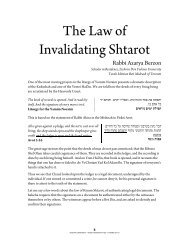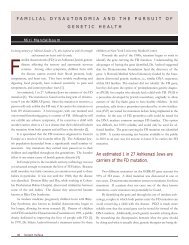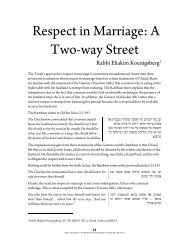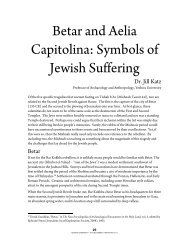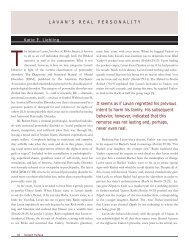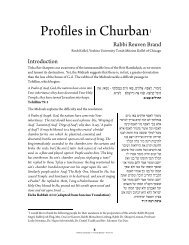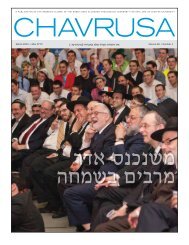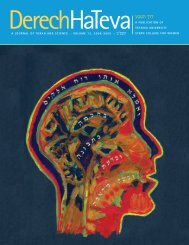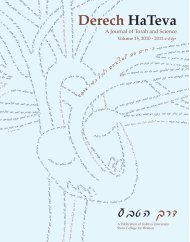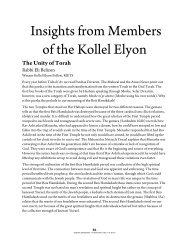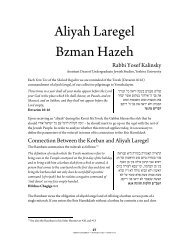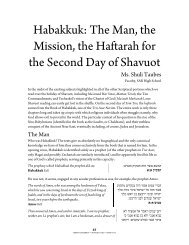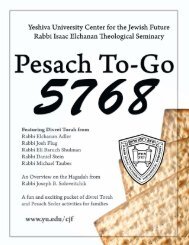YESHIVA UNIVERSITY • SUKKOT TO-GO ... - YU Torah Online
YESHIVA UNIVERSITY • SUKKOT TO-GO ... - YU Torah Online
YESHIVA UNIVERSITY • SUKKOT TO-GO ... - YU Torah Online
Create successful ePaper yourself
Turn your PDF publications into a flip-book with our unique Google optimized e-Paper software.
Scribing our Covenant:<br />
A Vision for Orthodoxy5<br />
Rabbi Kenneth Brander<br />
David Mitzner Dean, Yeshiva University’s Center for the Jewish Future<br />
This summer is the fifth consecutive summer in which twenty-two students traveled to the<br />
impoverished community of Dimona in Israel. These students participated in Yeshiva<br />
University’s Center for the Jewish Future Counterpoint Summer Program. Through this<br />
program Yeshiva University college students have the opportunity to work with children and<br />
teenagers in the development town of Dimona, where many of the children live beneath the<br />
poverty level and many would be hanging out on the streets if not for the summer program that<br />
we run. Most of the students are recruited from the Otzma classes, special classes for teens in the<br />
Dimona public schools who have behavioral issues. One of the goals of the summer camp<br />
includes helping develop the campers’ self esteem by teaching various skills, including a better<br />
knowledge of English. Each day, the counselors teach the children fifteen new vocabulary words.<br />
These words are then communicated in the various sessions and activities that take place<br />
throughout the day.<br />
Last year, one teenager who was part of the summer program had a severe stutter. At the same<br />
time, there was a <strong>YU</strong> counselor who also spoke with a stutter. We asked the counselor if he<br />
would work with the boy and show him that it is possible to overcome this challenge. When the<br />
counselor met the camper for the first time and explained that he also faced challenges from<br />
stuttering, the camper ran away from the counselor. The boy was angry to meet another person<br />
who stutters.<br />
A few days later, the camper began to form a connection with the counselor and did not leave his<br />
side until the end of camp. He literally followed the counselor around everywhere, not only<br />
during camp, but also on Shabbat, and every night after camp was over. At the end of the<br />
summer, the boy gave the <strong>YU</strong> counselor a beautiful thank you note written in Hebrew. With the<br />
exception of two lines, each line of the note was composed of three vocabulary words that he had<br />
learned that summer. The first line read: silence, past, fear. The second line read: future, courage,<br />
5 This drasha was delivered, on Parshat Eikev, as part of the Yeshiva University ChampionsGate Weekend<br />
Leadership Conference. The conference was attended by lay and rabbinic leaders from 80 communities across<br />
North America as well as leaders from Israel and South America. Due to numerous requests for the drasha, Rabbi<br />
Brander has written it as an essay. A complete list of the sources used to develop the ideas of the drasha can be<br />
obtained by emailing Rabbi.Brander@yu.edu<br />
16<br />
<strong>YESHIVA</strong> <strong>UNIVERSITY</strong> <strong>•</strong> <strong>SUKKOT</strong> <strong>TO</strong>-<strong>GO</strong> <strong>•</strong> TISHREI 5771



